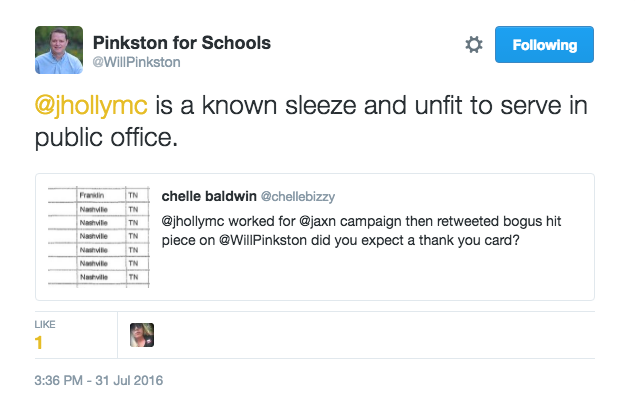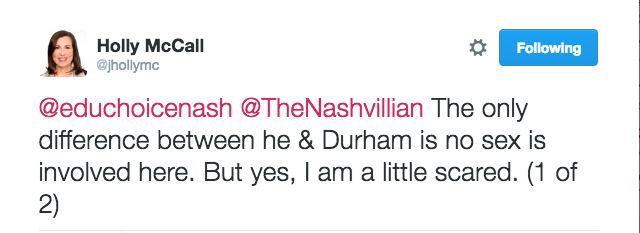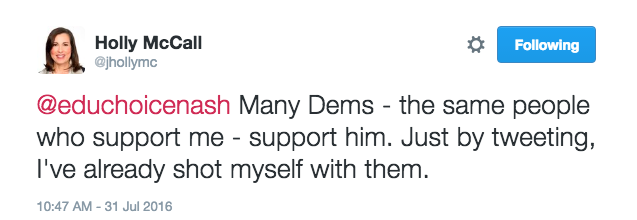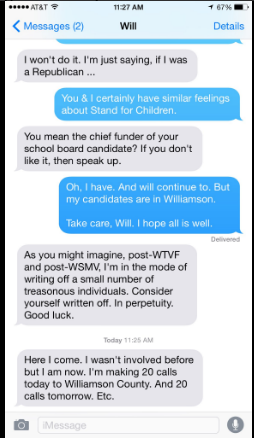 Today, we welcome Erin Coleman to the blog. Erin Coleman is currently running for state senate in District 20 against Senator Steve Dickerson.
Today, we welcome Erin Coleman to the blog. Erin Coleman is currently running for state senate in District 20 against Senator Steve Dickerson.
You can read Steve Dickerson’s interview here.
Can you tell us a little about yourself and why you are running for office?
I am a mother of three young children, a small-business owner, an attorney, and a U.S. Army veteran. Currently, there are no mothers of young children in the Tennessee Senate, and that viewpoint is sorely lacking. The state legislature has gotten sidetracked on wedge issues and bad behavior. The only way to change the culture of the state legislature is to change who serves in the state legislature. Senate District 20 deserves a senator that will put Nashville first. Let us decide issues and stop the state legislature from overriding our wishes every chance they get.
What role should the legislature and the state play in the education system?
The state legislature plays a huge role in funding education, in approving textbooks, in curriculum oversight,and in setting teaching licensure standards. In terms of funding, the state must get the BEP right and ensure that our large urban systems are getting the funding they need, especially for ELL. On the other issues, the legislature should work to ensure that the state is a productive partner with local officials. The state shouldn’t simply dictate to LEA’s. For example, the state should not have the authority to override local decisions on which charter schools are approved and which are not. Local officials are on the ground and know better than the state what is best for their districts.
What is one thing that the state is doing well in regards to the education system?
The state has two primary responsibilities- funding and assessment – and it is doing neither well. Prior to 2011, Tennessee was a national leader in education reform. Due to a lack of leadership, the state has since thrown that away. The responsibility for this failure falls most heavily on the members of the legislature’s Education Committees. They have led the race to the bottom in education in Tennessee.
What is one thing that the state is doing that needs to be changed or improved?
The state should not have the authority to override local decisions on charter schools. Charters have a valuable place in our education system, and locals know best what that place is. We should let our elected school boards do their jobs and keep the state out of it.
If elected, what education policies will you advocate for at the legislature?
Getting the BEP right. In order to thrive, school systems need financial resources. Nashville has a tremendous need for ELL funding. That must be taken into account in the BEP. I will also work to further expand Pre-K. There is no single education investment that can have as much of an impact as quality Pre-K.
How will you support Metro Nashville Public Schools as a state senator?
Over the past year, I have developed strong relationships with our MNPS Board members. I will meet with them regularly to determine their needs and how best I can help them in the Senate. I will also keep an open door for any parent, student, teacher, administrator, or school staffer that wants to talk to me. As a mom to three young children, I know how important a quality education is. In fact, I believe that educating our children is the single most-important thing our government does.
Thank you for your time. Is there anything else you would like to add? Where can readers go to find more about your campaign?
Visit erinfornashville.com or facebook.com/erinfornashville or twitter.com/ErinCforSD20 for the latest information about my campaign. This election presents a contrast between two distinct visions of what Nashville and Tennessee should be. I believe that our public education system is an essential building block in our community and it should be fully funded and supported. Our state legislature works to undercut public education at every turn. Unless we change who serves in the General Assembly, that will continue.
For more on education politics and policy in Tennessee, follow @TNEdReport.











